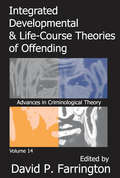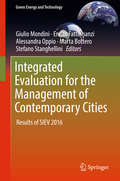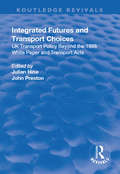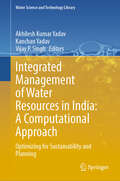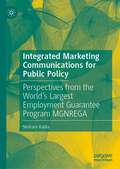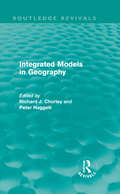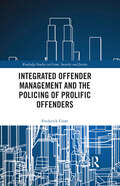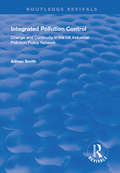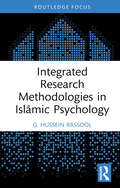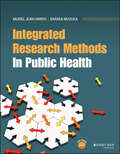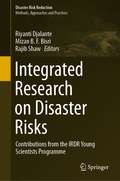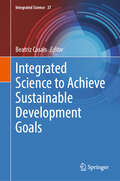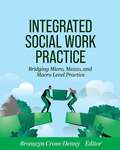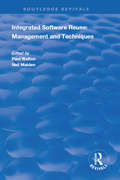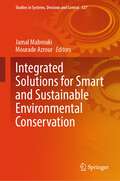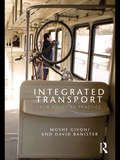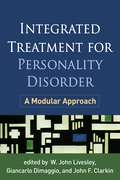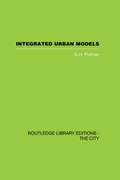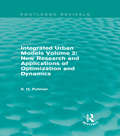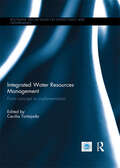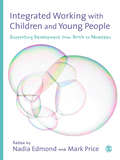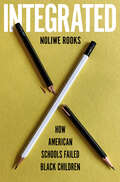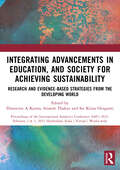- Table View
- List View
Integrated Developmental and Life-course Theories of Offending (Advances In Criminological Theory Ser.)
by David P. FarringtonDevelopmental and life-course criminology aims to provide information about how offending and antisocial behavior develops, about risk and protective factors at different ages, and about the effects of life events on the course of development. This volume advances knowledge about these theories of offender behavior, many of which have been formulated only in the last twenty years. It also integrates knowledge about individual, family, peer, school, neighborhood, community, and situational influences on offender behavior, and combines key elements of earlier theories such as strain, social learning, differential association, and control theory.Contributors Benjamin B. Lahey and Irwin D. Waldman focus on antisocial propensity and the importance of biological and individual factors. Alex R. Piquero and Terrie E. Moffitt distinguish between life-course-persistent and adolescent-limited offenders. David P. Farrington presents the Integrated Cognitive Antisocial Potential (ICAP) theory, which distinguishes between long-term and short-term influences on antisocial potential. Richard F. Catalano, J. David Hawkins, and their colleagues test the Social Development Model (SDM).Marc Le Blanc proposes an integrated multi-layered control theory, in which criminal behavior depends on bonding to society, psychological development, modeling, and constraints. Robert J. Sampson and John H. Laub hypothesize that offending is inhibited by the strength of bonding to family, peers, schools, and later adult social institutions such as marriage and jobs. Terence P. Thornberry and Marvin D. Krohn propose an interactional theory, of antisocial behavior. Per-Olof H. Witkstrom's developmental ecological action theory emphasizes the importance of situational factors: opportunities cause temptation, friction produces provocation, and monitoring and the risk of sanctions have deterrent effects.
Integrated Evaluation for the Management of Contemporary Cities: Results of SIEV 2016 (Green Energy and Technology)
by Stefano Stanghellini Marta Bottero Alessandra Oppio Giulio Mondini Enrico FattinnanziThis book highlights a selection of the best papers presented at the 2016 SIEV conference “The Laudato sì Encyclical Letter and Valuation. Cities between Conflict and Solidarity, Decay and Regeneration, Exclusion and Participation”, which was held in Rome, Italy, in April 2016, and brought together experts from a diverse range of fields – economics, appraisal, architecture, energy, urban planning, sociology, and the decision sciences – and government representatives. The book is divided into four parts: Human Ecology: Values and Paradigms; Integral Ecology and Natural Resource Management; Intergenerational Equity; and How to Enhance Dialogue and Transparency in Decision-making Processes. Cities are where 72% of all Europeans live, and this percentage is expected to rise to 80% by 2050. Given this trend towards urbanization, cities are continuously growing, which also entails a growing risk of social segregation, lack of security and mounting environmental problems. All too often, today’s cities have to cope with social and environmental crises, shifting the European urban agenda towards regeneration processes. Urban regeneration is more complex than merely renovating existing buildings, as it also involves social and environmental problems, inhabitants’ quality of life, protecting tangible and intangible cultural resources, innovation and business.
Integrated Futures and Transport Choices: UK Transport Policy Beyond the 1998 White Paper and Transport Acts
by JULIAN HINE AND JOHN PRESTONThis title was first published in 2003. The UK transport White Paper "A New Deal for Transport" and new Transport Acts for England, Wales and Scotland have indicated and defined the future direction and policy agenda of national governments. The need for integrated transport raises key policy issues, among which are: the importance of sustainability; and the integration of transport policy with other areas of public policy, such as social exclusion and health. The idea of this direction in policy has implications for the changing nature of work, traveller information, interchange and public transport, freight distribution and the use of new technology. This volume also examines key areas of policy and regulation, which are developing as a result of the White Paper and the new Transport Acts. The volume brings together leading UK academics in the field of transport studies to discuss and reflect on these issues, and the state of transport policy in the UK within this new and developing policy framework.
Integrated Management of Water Resources in India: Optimizing for Sustainability and Planning (Water Science and Technology Library #129)
by Vijay P. Singh Akhilesh Kumar Yadav Kanchan YadavThis book tackles the complexities of water management in India. Using computational tools, it provides comprehensive information on water availability, demand, climate change, integrated management, and governance. A must-read for researchers, policymakers, and water managers. The book is structured to provide a holistic understanding of water resources in India and the need for an integrated approach to their management. It explores various aspects of water management, including data collection and analysis, water allocation and planning, water quality management, and the intricate interdependencies within the water-energy-food nexus. One of the key focuses of this book is the application of computational approaches in the management of water resources. We explore the use of advanced modeling, simulation, and optimization techniques to facilitate decision making, assess water availability, and predict future scenarios. By employing computational tools, our goal is to bridge the gap between theoretical concepts and practical implementation, empowering water managers, policymakers, researchers, and other stakeholders to make informed and effective decisions. Throughout the book, we present case studies highlighting the application of computational approaches in diverse water management scenarios in India. These case studies offer valuable information on real-world challenges and demonstrate the potential of computational techniques to address complex water resources problems. We also explore the importance of stakeholder engagement, participatory approaches, and collaborative governance models, recognizing the importance of inclusive decision-making processes and local knowledge in achieving sustainable water management. The book is expected to serve as a valuable resource for students, researchers, professionals, and policymakers involved in water resource management in India. We aim to contribute to the ongoing efforts to ensure the availability of clean and adequate water resources for present and future generations.
Integrated Marketing Communications for Public Policy: Perspectives from the World’s Largest Employment Guarantee Program MGNREGA
by Shriram KadiaThis book is based on detailed empirical research conducted to analyse the communication dissemination approach applied to the world’s largest employment guarantee program MGNREGA (Mahatma Gandhi National Rural Employment Guarantee Act). To uncover the insights, perspectives and understanding of the program, more than 30 villages in Western parts of India were visited and more than 400 MGNREGA beneficiaries were contacted personally by the author. The book connects the two concepts of Integrated Marketing Communications (IMC) and Public Policy and highlights the importance of using the IMC tools for a meaningful and comprehensible communication dissemination strategies and campaigns. A global overview of public policy dissemination approaches adopted by federal governments in Brazil, Niger, Philippines, Indonesia, Pakistan, Bangladesh, South Africa, and Kenya have been presented to sensitize the readers with the communication dissemination strategies used at the global level. The book presents and discusses a conceptual framework for the ideal public policy communication initiatives and highlights the apt communications vehicles for the illiterate, vulnerable and marginalized beneficiaries.
Integrated Models in Geography (Routledge Revivals)
by Richard J. Chorley Peter HaggettFirst published in 1967, this book explores the theme of geographical generalization, or model building. It is composed of five of the chapters from the original Models in Geography, published in 1967. The first chapter broadly outlines this theme and examines the nature and function of generalized statements, ranging from conceptual models to scale models, in a geographical context. The following chapters deal with mixed-system model building in geography, wherein data, techniques and concepts in both physical and human geography are integrated. The book contains chapters on organisms and ecosystems as geographical models as well as spatial patterns in human geography. This text represents a robustly anti-idiographic statement of modern work in one of the major branches of geography.
Integrated Offender Management and the Policing of Prolific Offenders (Routledge Studies in Crime, Security and Justice)
by Frederick CramThis book analyses the impact of Integrated Offender Management (IOM) on contemporary policing and separates the rhetoric from the reality. Drawing on a qualitative study within an English police force over two years, this book examines the experiences of prolific offenders, subject to IOM, and sheds light on the culture and practice of the police and staff from other criminal justice agencies, working within the scheme. While IOM has been judged to have had initial successes in reducing the criminal activities of prolific offenders, this book tests the validity of such claims, and considers the apparent disjuncture between policy statements made about the workings of IOM and how IOM policing operations are realized on the ground. It makes a unique contribution to research on police culture and practice, and multi-agency working in the criminal justice system. An accessible and compelling read, this book will appeal to policymakers, as well as students and scholars of criminology, sociology policing, and politics.
Integrated Pollution Control: Change and Continuity in the UK Industrial Pollution Policy Network (Routledge Revivals)
by Adrian SmithFirst published in 1997, This book presents a detailed analysis of the Integrated Pollution Control (IPC) policy process. Using developments in the late nineties in the public policy literature to analyse and produce answers to why the government introduced IPC and how has IPC policy been implemented.
Integrated Research Methodologies in Islāmic Psychology (Islamic Psychology and Psychotherapy)
by G. Hussein RassoolThis book provides a foundation of the methodology of research scholarship in Islāmic studies, psychology and psychotherapy, offering an understanding of the concepts and techniques of Islāmic research methodology integrated with qualitative and quantitative research. Integrating Islāmic moral and epistemological values into research methodologies, the text synthesises research methodologies and approaches (empirical, rational) with Islāmic research scholarship. Chapters include a range of topics including research ethics from an Islamic perspective, systematic methodology of research in Islamic studies and social sciences and inductive and deductive approaches. Other questions covered include how to integrate the Qur’ân and Hadith (rules, concepts and statements) with psychological phenomena and how to write a research proposal and research paper. Each chapter includes rich case examples and relevant practical examples. This book is ideal for researchers and students in Islāmic psychology and psychotherapy wishing to learn more about the techniques and principles of Islāmic research scholarship in the field.
Integrated Research Methodologies in Islāmic Psychology (Islamic Psychology and Psychotherapy)
by G. Hussein RassoolThis book provides a foundation of the methodology of research scholarship in Islāmic studies, psychology and psychotherapy, offering an understanding of the concepts and techniques of Islāmic research methodology integrated with qualitative and quantitative research.Integrating Islāmic moral and epistemological values into research methodologies, the text synthesises research methodologies and approaches (empirical, rational) with Islāmic research scholarship. Chapters include a range of topics including research ethics from an Islamic perspective, systematic methodology of research in Islamic studies and social sciences and inductive and deductive approaches. Other questions covered include how to integrate the Qur’ân and Hadith (rules, concepts and statements) with psychological phenomena and how to write a research proposal and research paper. Each chapter includes rich case examples and relevant practical examples.This book is ideal for researchers and students in Islāmic psychology and psychotherapy wishing to learn more about the techniques and principles of Islāmic research scholarship in the field.
Integrated Research Methods In Public Health
by Muriel J. Harris Baraka MuvukaExplore an integrated approach to public health research methods In Integrated Research Methods in Public Health, a team of eminent public health researchers delivers an eye-opening exploration of public health research methods presented with integrative approaches to teaching that facilitate holistic and transformative learning experiences. The methods used in this book enable students to make connections between concepts and content areas more readily than with traditional approaches. In this book, readers will find extensive use of the concept of the co-construction of learning, in which the active participation of students and instructors in an interactive, varied, and student-centered learning environment is achieved. It also includes: Mini case studies, team learning exercises and worksheets, and group project outlines Literature reviews that showcase the latest developments in the research on the subject Integrated considerations of ethical issues, cultural responsiveness, theoretical foundations, and philosophical underpinningsPerfect for senior undergraduate and graduate students in public health, Integrated Research Methods in Public Health will also earn a place in the libraries of public health and social science academics and researchers, as well as public health practitioners and professionals working in non-profit organizations with public-health related services.
Integrated Research on Disaster Risks: Contributions from the IRDR Young Scientists Programme (Disaster Risk Reduction)
by Rajib Shaw Riyanti Djalante Mizan B. F. BisriThis book is a collection of works written by young scientists involved in the Integrated Disaster Risk Research (IRDR). Integrated Research on Disaster Risk (IRDR) is a decade-long research programme co-sponsored by the International Science Council (merged by International Council for Science (ICSU), the International Social Science Council (ISSC), and the United Nations Office for Disaster Risk Reduction (UNDRR). It is a global, multi-disciplinary approach to dealing with the challenges brought by natural disasters, mitigating their impacts, and improving related policy-making mechanisms. The book examines multidisciplinary research and actions related to disaster risk reduction internationally. The Integrated Research on Disaster Risk (IRDR) Young Scientists programme is: • A sub-programme within IRDR which promotes capacity building of young professionals and encourages them to undertake innovative and need-based research which makes science–policy and science–practice linkages stronger. • IRDR Young Scientists Programme was started in late 2016. Currently, it is a community of 115 young researchers from over 40 countries after 3 batches of application. • IRDR network and partners provide academic advice and training courses, workshops, and programmes for IRDR young scientists. • IRDR young scientists contribute to innovative research in the field of disaster risk reduction and participate in conferences and/or social media as the ambassador of IRDR. The book is of interest to researchers and scholars in the field of governance of sustainability and environmental governance. Postgraduate students will benefit this book within courses on environmental governance, on climate change governance, and on transformation and social change processes. Societal actors in climate change adaptation and other environmental governance fields on local, national, and international levels can benefit from the focus on societally relevant findings in the past 10 years of research on adaptiveness.
Integrated Science to Achieve Sustainable Development Goals (Integrated Science #37)
by Beatriz CasaisThe book &‘Integrated Science to achieve Sustainable Development Goals&’ debates how different fields of study can confront or mitigate problems or contribute together to the development of society. In brief, it is a book about the interdisciplinarity of knowledge surrounding the topics in society that are involved in the world development agenda. There is an increasing recognition of the importance of achieving the sustainable development goals (SDGs) set in the UN agenda 2030. The book seeks to address the need for the integration of multidisciplinary fields of knowledge to achieve the seventeen SDGs. The book was developed with contributions from established and well-known scholars in different fields. It is interdisciplinary in nature and international in scope, intending to bring out a collection of state-of-the-art/cutting-edge knowledge on policies to achieve the 17 SDGs as well as a range of actionable recommendations for future developments in the different fields with the purpose of addressing the Agenda 2030. The integration of different disciplines (including sociology, health, education, psychology, business, economics, political science, environmental studies and urban planning) in a complex problem like societal development gives this book the challenge to be an authoritative tool with guidelines for the entire community and for policymakers as well. Each chapter presents the state of the art of a topic considered important to achieve SDGs. The authors explain how their field contributes to the achievement of one or more SDGs, including the main theories and examples of empirical evidence that may guide society in using such knowledge to contribute to societal impact.
Integrated Social Work Practice: Bridging Micro, Mezzo, and Macro Level Practice
by Bronwyn Cross-DennyFeaturing contributed chapters written by a variety of experts in the field, Integrated Social Work Practice: Bridging Micro, Mezzo, and Macro Level Practice presents vital and contemporary concepts within the discipline as an integrated whole, valuing and examining each topic at the micro through macro level. Section I introduces students to integrated practice, providing a brief history of social work and examining client systems at the micro, mezzo, and macro levels. Section II focuses on the signature pedagogy of fieldwork and includes interprofessional collaboration, and self-care and wellbeing. In Section III, students explore the social work process-from engagement through termination-at all practice levels. Section IV focuses on social justice, including diversity, equity, and inclusion; anti-racism and multicultural competency; intersectionality; practice with aging and LGBTQ+ populations; and human rights. Students focus on topics related to global engagement in Section V. The final section encourages evaluation, self-reflection, and lifelong learning. Individual and group exercises, practice integration examples, In the Field features, and student narratives support the overall learning experience. Presenting students with a cutting-edge approach aligned with building key competencies, Integrated Social Work Practice is an invaluable textbook for B.S.W. and M.S.W. programs and courses.
Integrated Software Reuse: Management and Techniques (Routledge Revivals)
by Neil Maiden Paul WaltonPublished in 1993. Software reuse has been shown to achieve improvements in productivity, quality and timeliness of software. The collection of papers in this book were given at a seminar organized by UNICOM and the British Computer Society Software Reuse Specialist Group. They address the reasons why software reuse can maximize an organization's return from past expenditure and ensure a good future expenditure. Increasing the automation of software development requires access to explicit knowledge about processes and products involved. The chapters examine the relationship between reuse and other aspects of software engineering, including management techniques and structures, CASE, methodologies and object orientation. In addition, the papers aim to provide a structures insight into new techniques which will become available through the 1990s. This text is suitable for software managers and directors, software engineers, software professionals, academics, and other involved in software engineering research.
Integrated Solutions for Smart and Sustainable Environmental Conservation (Studies in Systems, Decision and Control #527)
by Mourade Azrour Jamal MabroukiResource depletion and ecological risks are more than ever at the heart of societal and economic debates. In the 1970s, the developed countries saw the Fordist growth regime crumble in parallel with the growing awareness of the ecological issue. Since the first industrial revolutions, technological dynamics have been the cause of many environmental problems, and there is a consensus on the diagnosis. Integrated technologies reduce resource use and/or pollution at source by using cleaner production methods. This generally leads to a reduction in the by-products, energy inputs and resources used by companies to produce goods. Integrated production technologies reduce negative environmental impacts at source by substituting or modifying cleaner technologies. Examples of integrated, or cleaner, production technologies are the recirculation of materials, the use of environmentally friendly materials (such as the substitution of water for organic solvents), etc. However, the implementation of integrated production technologies is often hampered by obstacles related to cost, coordination and skill inertia problems and to the productive organisation of companies. In addition to the high investment costs of new integrated technologies, additional barriers may emerge depending on the nature of the environmental problem and the type of environmental regulation in question.
Integrated Transport: From Policy to Practice
by David Banister Moshe GivoniTravel is an essential part of everyday life and today most journeys are multimodal. It is the total travel experience that counts and integrated transport must reduce the inconvenience of transfers between modes. Most research and many publications on transport policy advocate sustainable transport, but the priority given to integration has been negligible. Yet integration is one of the most important means to advance sustainable transport and sustainability more generally. While integrated transport systems are seen to be an ideal, there is a failure to make the transition from policy to practice. The authors argue that the achievement of sustainable transport is still a dream, as an integrated transport policy is a prerequisite for a sustainable transport system. It is only when the two concepts of sustainability and integration operate in the same direction and in a positive way that real progress can be made. In this book, transportation experts from across the world have addressed the questions about what is integration, why is it so important and why is it so hard to achieve? The book provides an in-depth analysis of these issues and it aims to provide a better understanding of the subject, about what should be strived for, about what is realistic to expect, and about how to move forward towards a more integrated provision of transport infrastructure, services and management.
Integrated Treatment for Personality Disorder
by W. John Livesley John F. Clarkin Giancarlo DimaggioRather than arguing for one best approach for treating personality disorder, this pragmatic book emphasizes the benefits of weaving together multiple well-established intervention strategies to meet each patient's needs. A framework is provided for constructing a comprehensive case formulation, planning treatment, and developing a strong therapeutic alliance. The clinician is guided to utilize techniques from all major therapeutic orientations to address transdiagnostic personality symptoms and problems involving emotion regulation, interpersonal functioning, and self and identity. Showing how to pick and choose from "what works" in a thoughtful, coordinated fashion, the book features rich clinical illustrations, including a chapter-length case example.
Integrated Urban Models Volume 1 (RLE: The City): New Research And Applications Of Optimization And Dynamics
by S. H. PutmanThis book was first published in 1983.
Integrated Urban Models Volume 2: New Research and Applications of Optimization and Dynamics (Routledge Revivals)
by Stephen H. PutmanFollowing on from Integrated Models Volume 1: Policy Analysis of Transportation and Lane Use (Routledge Library Editions, 2006), this book bridges the gap between the scholars and the practitioners of transportation and land-use modelling. First published in 1991, chapters discuss model-calibration and model-solution problems, describe a series of numerical and policy analyses, and propose potential directions for location and land-use research. This reissue will be of particular value to undergraduate and postgraduate geography students with an interest in integrated urban modelling; in particular, the research conducted in the field over the past two decades.
Integrated Water Resources Management: From concept to implementation (Routledge Special Issues on Water Policy and Governance)
by Cecilia TortajadaThe book includes seventeen excellent researched and documented papers that reflect the diversity of thought, ideas and experiences related to IWRM. They draw from an extensive, inclusive and geographically representative range of theoretical propositions and practical examples. These include the implementation status of the IWRM concept at local, basin, regional and national levels; its appropriateness for the twenty-first century; main implementation gaps from the institutional, legal, policy, governance, management and technical viewpoints; the likelihood that IWRM’s entrenchment in laws, regulations and policies has led to smoother implementation and the reasons why that has been the case; reflexions on whether the attention given to IWRM is pushing other alternatives to the policy periphery; and the new conceptual constructions that can be put forward for discussion in the international arena.For the development and water communities it is imperative to debate and reach towards more illustrative conclusions regarding whether the promotion of the IWRM concept and its actual implementation status have been beneficial for development and how the notion could evolve to achieve this end. In-depth objective and constructive discussions, arguments, proposals and ideas are put forward for analysis by all interested parties. The book has the objective of fostering scholarly exchange, encouraging intellectual debate and promoting the advancement of knowledge and understanding of IWRM as a concept, as a goal per se and as a strategy towards development goals.This book was published as a special issue of the International Journal of Water Resources Development.
Integrated Working with Children and Young People: Supporting Development from Birth to Nineteen
by Ms Nadia Edmond Mr Mark PriceThis interdisciplinary core textbook looks at learning and development from birth to 19 years providing, an accessible introduction to the common areas of study across the many roles supporting learning and development in the young people's workforce. There is coverage of common themes and issues, and theory is closely integrated with practice throughout. Chapters cover: - physical development - cognitive development - social and emotional development - professionalism - leadership - quality and effectiveness - working with families - safeguarding and promoting well-being - transitions - equality and inclusion Reflection points, workplace activities and professional development planners are all included and these challenge readers and students to critically engage with theory in their own practice. The book focuses on the key areas of knowledge that all those working with children are required to study, and places them firmly in the context of working together to support children and young people. Nadia Edmond is Assistant Head of School (Teaching and Learning/CPD), at the University of Brighton. Mark Price is Principal Lecturer and Foundation and Honours Degree Programme Leader Working with Children and Young People at the University of Brighton.
Integrated: How American Schools Failed Black Children
by Noliwe RooksA powerful, incisive reckoning with the impacts of school desegregation that traces four generations of the author&’s family to show how the implementation of integration decimated Black school systems and did much of the Black community a disserviceOn May 17, 1954 the landmark case Brown v. Board of Education determined that racial segregation in schools was unconstitutional. Heralded as a massive victory for civil rights, the decision's goal was to give Black children equitable access to educational opportunities and clear a path to a better future. Yet in the years following the ruling, schools in predominantly Black neighborhoods were shuttered or saw their funding dwindle, Black educators were fired en masse, and Black children faced discrimination and violence from their white peers as they joined resource-rich schools that were ill-prepared for the influx of new students.Award-winning interdisciplinary scholar of education and Black history Noliwe Rooks weaves together sociological data and cultural history to challenge the idea that integration was a boon for Black children. She tells the story of her grandparents, who were among the thousands of Black teachers fired following the Brown decision; her father, who was traumatized by his experiences at an almost exclusively-white school; her own experiences moving from a flourishing, racially diverse school to an underserved inner-city one; and finally her son and his Black peers, who over half-century after Brown still struggle with hostility and prejudice from white teachers and students alike. She also shows how present-day discrimination lawsuits directly stem from the mistakes made during integration.At once assiduously researched and deeply engaging, Integrated tells the story of how education has remained both a tool for community progress and a seemingly inscrutable cultural puzzle. Rooks' deft hand turns the story of integration's past and future on it's head, and shows how we may better understand and support generations of students to come.
Integrating Aboriginal Perspectives Into the School Curriculum
by Yatta KanuFrom improved critical thinking to increased self-esteem and school retention, teachers and students have noted many benefits to bringing Aboriginal viewpoints into public school classrooms. In Integrating Aboriginal Perspectives Into the School Curriculum, Yatta Kanu provides the first comprehensive study of how these frameworks can be effectively implemented to maximize Indigenous students' engagement, learning, and academic achievement. Based on six years of empirical research, Kanu offers insights from youths, instructors, and school administrators, highlighting specific elements that make a difference in achieving positive educational outcomes. Drawing on a wide range of disciplines, from cognitive psychology to civics, her findings are widely applicable across both pedagogical subjects and diverse cultural groups. Kanu combines theoretical analysis and practical recommendations to emphasize the need for fresh thinking and creative experimentation in developing curricula and policy. Amidst global calls to increase school success for Indigenous students, this work is a timely and valuable addition to the literature on Aboriginal education.
Integrating Advancements in Education, and Society for Achieving Sustainability: Research and Evidence-Based Strategies from the Developing world
by Sai Kiran Oruganti Dimitrios A. Karras Srinesh ThakurThis book is the collection of selected articles that appeared at the First International Analytics Conference 2023 held in Hyderabad in virtual mode on February 2nd the 3rd 2023. In an era defined by the twin imperatives of knowledge and sustainability, this compelling volume explores the powerful synergy between advancements in education and the transformation of society towards a more sustainable future. Delve into the heart of progress as educators, innovators, and change-makers come together to catalyze positive change. Within these pages, you’ll witness the transformative potential of education as it equips individuals with the skills, knowledge, and perspectives necessary to address the multifaceted challenges of sustainability. Discover groundbreaking pedagogical approaches, innovative technologies, and visionary programs that are revolutionizing learning and inspiring the next generation of leaders.Simultaneously, the book sheds light on the interconnected relationship between education and society, illustrating how an informed and engaged citizenry is driving sustainable practices, community resilience, and global change. From eco-conscious urban planning to social entrepreneurship, it showcases the societal initiatives that emerge when education and sustainability combine forces.‘Integrating Advancements in Education and Society for Achieving Sustainability’ is a compass for those navigating the path towards a brighter, more sustainable future. Join us in this thought-provoking exploration of how education and society are jointly shaping the way we think, act, and work together to achieve a harmonious balance with the world around us.
